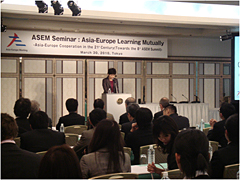The Asia-Europe Meeting (ASEM):
Asia-Europe Learning Mutually
Asia-Europe Cooperation in the 21st Century
(Towards the 8th ASEM Summit [Note 1])
(Outline)
March 31, 2010

Ms. Chinami NISHIMURA, Parliamentary Vice-Minister for Foreign Affairs of Japan,
giving the opening remarks at the seminar
[Note 1] The 8th ASEM Summit will be held from October 4 to 5 in Brussels, Belgium.
1. Outline of the Seminar
1) Date: March 30, 2010 (Tues), 10:30 - 17:15
2) Location: Hotel New Otani
3) Groups holding the Seminar:
A. Hosted by Ministry of Foreign Affairs, JAPAN
B. In collaboration with Asia-Europe Foundation (ASEF)
C. Supported by Ministry of Education, Culture, Sports, Science and Technology, JAPAN
This Seminar is also held as an ASEM Initiative [Note 2] co-sponsored by countries (organizations) consisting of the Governments of Belgium, China, and Spain, as well as the European Commission.
[Note 2] The ASEM Member Countries propose meetings, seminars, new frameworks, and projects regarding issues of their priorities and carry them out with the approval of other Member Countries.
4) Overview:
Ms. Chinami NISHIMURA, Parliamentary Vice-Minister for Foreign Affairs of Japan, gave the opening remarks regarding the purpose of the Seminar. Ambassador Masafumi ISHII, Japan's ASEM SOM leader and Deputy Director-General, Foreign Policy Bureau, Ministry of Foreign Affairs of Japan, served as moderator. The Seminar was held as follows.
- Keynote speech, "Towards the 8th ASEM Summi
- Keynote speech, "How to make a community through people-to-people exchange," given by Prof. Toshiro TANAKA, Professor, Keio University
- Question and answer session
- Keynote speech, "ASEAN and Asian Cooperation - Dynamics of Intra- and Trans-regionalism and impact on Higher Education Collaboration," given by Dr. YEO Lay Hwee, Director, European Union Centre and Senior Research Fellow, the Singapore Institute of International Affairs (SIIA)
- Keynote speech, "Efforts for Inter-University Exchanges in Asia," given by Mr. Masayuki SHIBATA, Director, International Affairs Division, Minister's Secretariat, Ministry of Education, Culture, Sports, Science and Technology
- Keynote speech, "The ASEF Initiatives and Issues Regarding Cooperation between Asia and Europe," given by Ambassador Dominique GIRARD, Executive Director, ASEF
- Question and answer session
D. Overall Wrap-up by the moderator
2. Main Results of Discussion
(1) Among the three main pillars of the ASEM (politics, economy, and culture), the most significant progress has been made in the field of culture. Cultural exchange is important in the realm of soft security, and they shared a perception that it is a field which will display the added value of the ASEM in the future was shared.
(2) Mutual understanding and trust between people is essential for regional sustainable development. It was newly confirmed that it is important to promote exchange between people, especially exchange between the youth, steadily over a long period of time.
(3) The opinions were shared regarding the point that the framework of the ASEM should promote concrete measures in the same way that the European Region Action Scheme for the Mobility of University Students (ERASMUS) Programme became a corner stone for supporting European integration.
(4) The opinion was brought up that, conversely, in order to increase the exchange between people of the European Union nations and East Asia, it was necessary to improve the quality of institutions of higher education in East Asia.
(5) Furthermore, the opinion was expressed that, for the sustainable development of a peaceful and stable international society, the ASEM could potentially play a role in dealing with challenges that face both Japan and Europe including anti-piracy measures, climate change, and issues of Africa.
(6) It was also confirmed that the ASEF has come to play a constant role in promoting the exchange of people and culture between Asia and Europe as the only permanent body of the ASEM which does not hold a physical secretrariat. It was also agreed that, because of this, the ASEF should be highly evaluated and that there is a necessity for the ASEM partners to further support the activities of the ASEF.
(7) A large number of participants(approximately 160), who are composed of officials from the embassies of the ASEM member countries in Tokyo, academic scholars, young researchers, university students, and journalists in Japan attended this event. As a result, lively exchanges of opinions took place in the Seminar, and it was a good opportunity to deepen understanding and awareness of ASEM and ASEF activities as well as to consider Japan's contributions to the 8th ASEM Summit.
Back to Index
